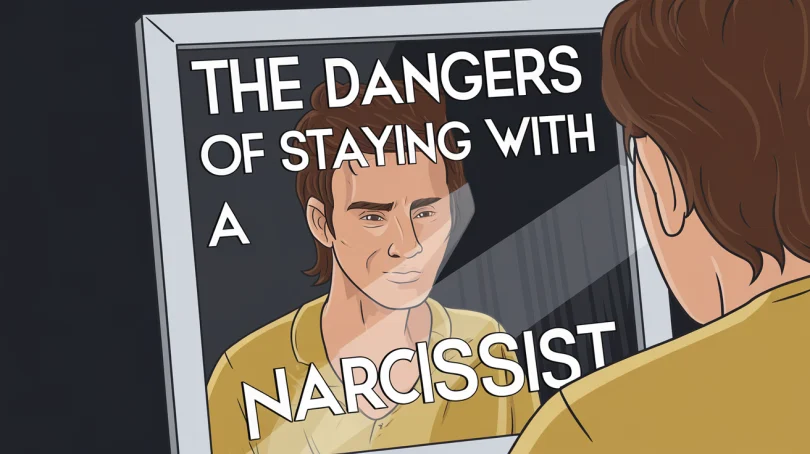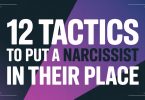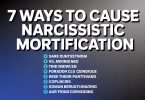I am often asked some version of the following question: I’m in a relationship with a narcissist, and I don’t want to leave, or I can’t leave… What do I need to know to make this work in the best possible way? A long-term relationship with a narcissist can be devastating on every level, and from the outside, it’s easy to say, “Just leave!” But many factors can make leaving a lot more complicated. For example, children, finances, religious beliefs, a lack of self-esteem, and fear due to years of psychological abuse.
First, I think it’s imperative to talk about why narcissists treat their partners in the ways that they do. Here’s the thing: narcissists struggle intensely with their self-worth and sense of self. Their ego is incredibly fragile, and they hide behind a grandiose false facade.
So when something threatens their self-esteem, they have two options: one, go into a deep self-hating shame storm; or two, inflate themselves by insisting that they are special, entitled, and perfect while devaluing those around them and treating others as inferior idiots.
Narcissistic relationships happen in stages, But to quickly summarize these stages, narcissists begin all relationships with love bombing and usually se*x bombing as well.
This is where they idealize you, put you on a pedestal, and act like the perfect partner by saying and doing incredibly sweet things for you, giving you all the se*x you want, going over and above, and making you feel very, very special. They might buy you extravagant gifts, take you on trips, and appear extremely helpful. During this stage, you will truly believe that all of your prayers have been answered; you will think that this person will make your life so much easier. But in reality, they are assessing you to see if you will be able to supply their deeply damaged ego.
During this initial stage, the narcissist is on their best behavior. They might share vulnerable information, pull on your heartstrings and empathy strings, and you may be quite impressed at everything they’ve managed to overcome and accomplish. But soon, their personality disorder will start to rear its head, and you will meet a completely different side of them. If you’ve had this type of Jekyll and Hyde experience, please feel free to share in the comment section below.
Many narcissists are unaware that they are narcissists, and they truly cannot see how their symptoms and their behaviors are causing major problems in their lives, especially in their relationships. Instead, they genuinely see you and anyone else who threatens their fragile ego as the real problem, and in their mind, that problem needs to be eliminated or at least tightly controlled. The devaluation stage will begin slowly and subtly, but as the relationship progresses, you will get to know this dark side of them well.
The first time they devalue you, maybe you’ll stand up for yourself. You may question if you even heard that right. You might try to come up with alternate explanations; you might give them the benefit of the doubt, thinking that this is just a one-off maybe they’re stressed out or having a bad day. But as time goes on, it’ll happen more and more frequently.
Soon, you will start to feel extremely confused. You may start to doubt yourself and question whether you are the problem. You may try to explain yourself and try hard to communicate and work the problems out, but no matter how hard you try, you’ll continue to be subjected to a variety of punishments and manipulation tactics that will get worse over time.
The narcissist’s self-worth is so low, and their ego is so fragile that their only way to feel better is to knock you down as a way to inflate themselves. Their tactics are aimed at instilling fear, creating confusion, lowering your self-worth, and heightening your sense of guilt and sense of obligation towards them.
Ultimately, narcissists crave attention and need others to see them in a favorable light. Their deep insecurities lead them to create this false self and this false reality, which they expect others to play along with, even though their narrative is the farthest thing from reality.
If you challenge this false reality, no matter how gently, the narcissist will get deeply, deeply offended. And what most fail to understand is that this is a defense mechanism. As much as the narcissist may come across as confident, grandiose, and full of themselves, they are incredibly sensitive to anything that threatens their fragile, fragmented ego, and they are working so hard to protect this fragile self.
When you threaten their ego, they see you as a threat of epic proportions, and they will attempt to annihilate you because, in their mind, that’s exactly what you’re trying to do to them. Their behavior can go far beyond insulting and invalidating you, and it can get downright abusive, as they are now seeing you as Enemy Number One.
They may discard you at this point, or if they still need resources or services from you, they may keep you around and tightly under control. Now, not all narcissists have such severe symptoms, but generally, if you cross a narcissist, they will immediately depersonalize you and lash out in destructive ways, and they won’t feel bad about it because, in their mind, you struck first.
If you’ve never experienced narcissistic abuse, you may be thinking, “If I was treated this way, I would just leave. I’d leave so fast!” But what you might not realize is that these manipulation tactics and mind games often creep up slowly and subtly. Where you used to feel extremely loved by the narcissist, where you used to be treated like gold, where they went over and above giving you all of their time and attention, now they are pulling away, indifferent, or even disgusted by you, making you feel that their change of heart towards you is your fault.
So what happens if you choose to stay in a long-term relationship with a narcissist? Once you start to recognize this pattern of devaluation, if you’re lucky, you’ll be discarded, which in the moment might seem like a horrible outcome. But being discarded by a narcissist simply means that you are not a suitable supply for their ego. See, the narcissist has very little capacity for intimacy or empathy, and they need others to be a dumping ground for their shame and other negative emotions. They also require constant attention, admiration, adoration, and validation to keep their ego inflated so that they don’t have to feel helpless, worthless, or empty.
So for partners, the worst fate in staying in this type of relationship is that it will get increasingly toxic over time, more abusive, and no matter what you do, or how hard you try, nothing will improve.
As you continue your efforts to find solutions while simultaneously being manipulated, punished, shut down, and knocked down, you will start to feel helpless and worthless. If you stand up to the narcissist, set boundaries, or expose them in any way, they will retaliate as though engaging in some invisible war against you. And once this downward spiral begins, there is no shifting this negative momentum.
You will either submit and become a psychological slave, giving them a full license to control and abuse you or if you continue to challenge the narcissist, you will discover their endless arsenal of weapons of psychological mass destruction. No matter your response, you will face their wrath as the narcissist works to crush your self-worth and sense of self.
So the biggest danger of remaining with a narcissist is that you will lose your sense of self, your needs, your values, your goals, and your personality. As you feel more and more helpless, worthless, and empty, fast forward 5, 10, 20, 30 years, and you likely won’t recognize yourself in the mirror.
You might have trust issues, constantly doubting and second-guessing yourself, unable to even think for yourself. You may feel as though you’re not good enough for anyone, and you may feel like you just can’t reclaim your life after having been in this psychological war zone for so long. But if you need help recovering from a toxic relationship, contact a therapist in your area who can help you.
Being in a long-term relationship with a narcissist is comparable to running a thousand-mile race. It’s about endurance and your ability to endure the mind games, selfishness, double standards, and emotional and psychological abuse. But no matter who you are, or how resilient you are, everyone has a breaking point. But my question for you is: why wait until you’re broken, until you can’t take it anymore? Don’t wait until sui*cide starts to seem like a good exit strategy.
Now, if you feel like you have no choice but to stay in a toxic relationship with a narcissist for whatever reasons, here are a few tips to hopefully help you out.
Number one: stop trying to defend, explain, or justify your actions.
The narcissist is not going to acknowledge or accept your defense, no matter how great it is. Putting yourself in a position where you feel the need to defend yourself is their ultimate goal because when you take a defensive stance, the burden of proof is on you. The narcissist can then simply sit back and relax as you strive to establish your good intentions and innocence. Then, when they inevitably reject your defense, it will create more doubt and confusion in you, leading you to expend even more energy and effort to prove and exonerate yourself.
Number two: stop looking for acceptance and validation from the narcissist.
This puts you in a position where you are working very, very hard to prove that you’re a good person with good intentions and integrity. However, when the narcissist inevitably dismisses your attempts to gain their validation, it further reinforces the notion that you are not worthy of their acceptance or anyone else’s.
Number three: don’t take things personally.
Even though it may appear incredibly personal when the narcissist hits you where you are most vulnerable, it’s not about you as an individual. In other words, regardless of who the narcissist is in a relationship with, they will exhibit these same behavior patterns.
So you’ll need to strengthen your emotional defenses and remind yourself that their insults stem from their personality disorder, likely rooted in a traumatic upbringing. This doesn’t mean you should feel sorry for them or enable the narcissist, but if you choose to remain in a relationship with them, prepare yourself for ongoing attacks. Get your bulletproof vest on expect the bullets to keep coming and dodge as many as possible.







Leave a Comment